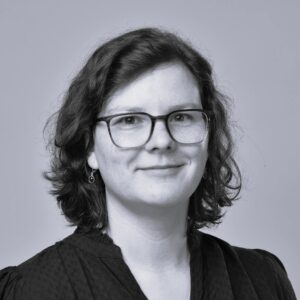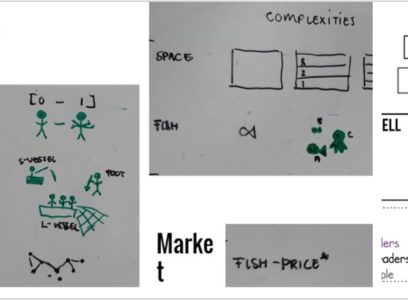 I am a PhD student at the Institute for European Ethnology at Humboldt Universität zu Berlin with a focus on science and technology studies and submitted my thesis in April. Until recently I worked as a research associate in a DFG-funded project at HU Berlin and TU Munich. In 2018, I received my M.A. in European Ethnology on “Knowledge Practices in the Modelling of ‘Socio-Ecological Coevolutions’“. Before, I studied social and cultural anthropology at Freie Universität Berlin and Aix-Marseille Université, France. Departing from classical laboratory studies, I am interested in current knowledge production in the environmental sciences and sustainability research (especially mathematical modeling and computer simulations), human-environment relations, complexity science and research methodologies in general. I deeply enjoy working in and communicating across interdisciplinary contexts.
I am a PhD student at the Institute for European Ethnology at Humboldt Universität zu Berlin with a focus on science and technology studies and submitted my thesis in April. Until recently I worked as a research associate in a DFG-funded project at HU Berlin and TU Munich. In 2018, I received my M.A. in European Ethnology on “Knowledge Practices in the Modelling of ‘Socio-Ecological Coevolutions’“. Before, I studied social and cultural anthropology at Freie Universität Berlin and Aix-Marseille Université, France. Departing from classical laboratory studies, I am interested in current knowledge production in the environmental sciences and sustainability research (especially mathematical modeling and computer simulations), human-environment relations, complexity science and research methodologies in general. I deeply enjoy working in and communicating across interdisciplinary contexts.
Contact: anja.klein@hu-berlin.de
Find me also at: IRI THEsys | ResearchGate | Institute for European Ethnology | CECO (Code Ethnography Collective) | ORCiD
PhD research (funded by DFG project no. 497511081): Doing difference, materiality and complexity with simulation models: An ethnography of modeling social-ecological relations in interdisciplinary sustainability research
Mathematical and computational modeling has become a central knowledge practice in scientific knowledge production across the disciplines. Especially environmental modeling of the climate and the earth system hast gained a certain political attention. My PhD-project takes the modeling of human-environment processes in the environmental sciences as an object of ethnographic inquiry. The central research question is: How are human-environment- relations understood, conceptualized and done in modeling? I will conduct ethnographic fieldwork with working groups of modelers who follow very different approaches in modeling these dynamics: First, the modeling of social-ecological systems as complex adaptive systems on a local to regional scale and secondly the integration of “human dynamics” into already existing large scale earth system or land-use models.
The aims of this project are disciplinary as well as interdisciplinary. From a perspective in anthropological Science and Technology Studies, I am interested in understanding the ontological assumptions and practices in modeling human agency, collectivity, environmental dynamics, complexity, the social etc. and how these produce frictions with concepts in anthropology. Concerning interdisciplinarity, I am interested in (1) how the working groups practice interdisciplinarity, (2) how translation and communication between modeling and anthropological methods concerning their respective boundaries and benefits might be enhanced and (3) the comparison of the cases aims at operationalizing the notion of “situated knowledges” in order to support our development of a framework of “Situated Modeling” at the Integrative Research Institute on Transformations of Human-Environment Systems (IRI THESys, HU Berlin).
Publications
2025
Situating Bayesian Knowledge: A Case Study of Modelling Pollutant Transfers from Land to Water Journal Article
In: Computational Culture, 2025.
Disentangling the entangled in productive ways: modelling social–ecological systems from a process-relational perspective Journal Article
In: Sustainability Science, vol. 20, pp. 793-815, 2025.
Transforming a world that never stands still Journal Article
In: Ecosystems and People, 2025.
2024
2024, visited: 23.12.2024.
From situated knowledges to situated modelling: a relational framework for simulation modelling Journal Article
In: Ecosystems and People, vol. 20, iss. 1, pp. 2361706, 2024.
2021
Ethnografische Theorie ko-laborativ fügen Journal Article
In: Hamburger Journal für Kulturanthropologie (HJK), vol. 13, pp. 522-555, 2021.
2019
After Practice. Thinking through Matter(s) and Meaning Relationally. Volume I Collection
Panama Verlag, Berlin, 2019.
After Practice. Thinking through Matter(s) and Meaning Relationally. Volume II Collection
Panama Verlag, Berlin, 2019.
Current work in the Laboratory: Anthropology of Environment | Human Relations: Doing research in a more-than-thought collective Journal Article
In: EASST Review, vol. 38, no. 2, 2019.
From the Collaboratory Social Anthropology & Life Sciences to the Laboratory: Anthropology of Environment | Human Relations Journal Article
In: EASST Review, vol. 38, no. 2, 2019.
2018
Humboldt Universität zu Berlin, Berlin, 2018.
Assembling Comparators – Assembling Reflexivities Journal Article
In: Science as Culture, vol. 27, no. 4, pp. 563-568, 2018.

